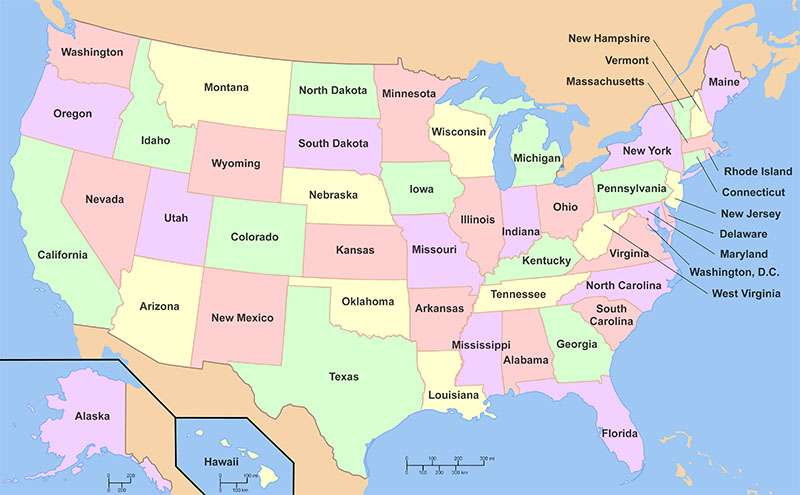
Social Studies Practice Questions – Civics and Government
- Posted by Brian Stocker MA
- Date December 15, 2014
- Comments 1 comment
Civics and Government Practice Questions
Practice Questions
1. The main purpose of dividing the government into three branches is
a. so that no one branch could become too powerful
b. so that at least one branch could survive in case of an attack
c. to triple the strength of the government
d. to take away power from the military
2. What is the minimum age to serve in the House of Representatives?
a. 35
b. 30
c. 25
d. 18
3. How does a bill become a law?
a. It passes through the Senate and is then signed by the President
b. It is signed by the President and is then passed by Parliament”
c. It passes through both houses of Congress and is vetoed by the President
d. It passes through both houses of Congress and is signed by the President
4. How can congress override a presidential veto?
a. With a 2/3 majority vote
b. With a simple majority vote
c. With a reconciliation bill
d. There is no way to override a presidential veto
5. How is an amendment added to the Constitution?
a. With a majority vote in Congress and the President’s signature
b. With 3/4 of the states ratifying it
c. With a 2/3 majority vote in Congress
d. With a majority of the popular vote
6. How many days (excluding Sundays) does the President have to sign a bill into law?
a. 10
b. 5
c. 30
d. 90
7. How many senators represent each state?
a. 2
b. 3
c. it depends on the state’s geographical size
d. it depends on the size of the state’s population
8. Whose vote breaks a tie in the Senate?
a. the President
b. the Vice President
c. the Speaker of the House
d. the Supreme Court
Taking a Test? We can Help!
9. How many congressmen represent each state?
a. 2
b. 3
c. it depends on the state’s geographical size
d. it depends on the size of the state’s population
10. The U.S. Constitution designed the legislature to be bicameral. What does bicameral mean?
a. There are two political parties
b. There are three branches of government
c. There are two levels of government: state and federal
d. There are two houses of Congress
11. Freedom of speech and freedom of religion are guaranteed in which constitutional amendment?
a. the first
b. the second
c. the third
d. the fourth
12. The right to bear arms is guaranteed in the
a. Declaration of Independence
b. Bill of Rights
c. Magna Carta
d. Articles of Confederation
13. The right to habeas corpus guarantees that you cannot be arrested and held by the police unless
a. you broke the law
b. you are charged with a crime
c. you are an American citizen
d. you are given a phone call
14. Citizens can be summoned to court to serve as a member of a
a. jury
b. counsel
c. association
d. law firm
15. A demand to appear in court as a witness is called a
a. verdict
b. accusation
c. ruling
d. subpoena
16. To plead the Fifth Amendment refers to what?
a. the right to bear arms
b. the right to an education
c. the right not to incriminate yourself in court
d. the right to have an attorney in court
Taking a Test? We can Help!
Answer Key
1. A
The main purpose of dividing the government is to prevent one branch from becoming too powerful, and a dictatorship from taking hold. Choice B is incorrect, but may sound plausible to someone unfamiliar with divided government. Choice C is incorrect; dividing the government does not strengthen it. Choice D is incorrect; the military has little to do with this.
2. C
The minimum age to serve in the House of Representatives is 25. Choice A is incorrect, 35 is the age for president. Choice B is incorrect, 30 is the age for Senators. Choice D is incorrect, 18 is the age of majority.
3. D
A bill becomes law when it passes through both houses of Congress and is signed by the President. Choice A is incorrect, a bill must pass through the House and the Senate, and then it can be signed by the President. Choice B is clearly incorrect because Parliament is part of the English government. Choice C is incorrect; a veto negates the passage of a law.
4. A
Congress can override a presidential veto with a two-thirds majority vote. Choice B is incorrect; a simple majority vote is required to pass a bill. Choice C is incorrect, reconciliation bills have to do with budgets. Choice D is incorrect, a veto can be overridden.
5. B
An amendment added to the constitution with three-quarters of the states ratifying it. Choice A is incorrect; this is the process for a regular bill. Choice C is incorrect; this is the process to override a veto. Choice D is incorrect; virtually nothing is decided by national popular vote.
6. A
The president has 10 days (excluding Sundays) to sign a bill into law.
7. A
Two senators represent each state. Choice C is incorrect but may seem plausible due to house representation being proportional. Choice D is incorrect; the size of the state’s population determines house representation.
8. B
The Vice President is considered president of the Senate, and their vote breaks a tie. Choice A is incorrect; the President stays separate from congress. Choice C is incorrect; the Speaker of the House stays separate from the Senate. Choice D is clearly incorrect because the Supreme Court does not legislate.
9. D
The number of congressmen that represent each state depends on the size of the state’s population. Choice A is incorrect, each state has 2 senators. Choice C is incorrect but may seem plausible due to representation being proportional to population.
10. D
The U.S. Constitution designed the legislature to be bicameral, which means having two branches or chambers. Choice A. is incorrect but may seem plausible due to the prefix bi-. Choice B is clearly incorrect because bi- means two. Choice C is incorrect by definition and because there are many levels of government: city, county, state, federal.
11. A
Freedom of speech and freedom of religion are guaranteed in the first amendment.
Choice B is incorrect, the second amendment is the right to bear arms. Choice C is incorrect; the third amendment has to do with the quartering of soldiers. Choice D is incorrect; the fourth amendment has to do with personal security.
12. B
The right to bear arms is guaranteed in the Bill of Rights, which contains the 2nd amendment. Choice A is incorrect; the Declaration of Independence lists grievances against England. Choice C is incorrect; the Magna Charta did not guarantee any rights for the people. Choice D is incorrect; the Articles of Confederation predate the Bill of Rights.
13. B
The right to habeas corpus guarantees that if you are held for more than a day you must be charged with a crime. Choice A is incorrect; the police can still arrest you. Choice C is incorrect, non-citizens can be arrested. Choice D is incorrect, although it may seem plausible since you are given a phone call after an arrest.
14. A
One civic duty is citizens can be summoned to court to serve as a member of a jury. Choice B is incorrect, counsel refers to lawyers. Choice D is clearly incorrect since one must be a lawyer to join a law firm.
15. D
A demand to appear in court as a witness is called a subpoena. Choice A is incorrect, a verdict is a decision made by a jury. Choice B is incorrect, witnesses are not the accused. Choice C is incorrect; a ruling is a decision by a judge.
16. C
The 5th is the right not to incriminate yourself in court. Choice A is incorrect; the right to bear arms is in the 2nd amendment. Choice B is incorrect; the right to an education is not listed in the Bill of Rights. Choice D is incorrect, although defendants do have the right to have an attorney in court.
Date Published: Monday, December 15th, 2014
Date Modified: Monday, March 14th, 2022
How to Solve Linear Equations with 2 Variables - Tutorial and Practice
You may also like

Listening Comprehension Practice – Solving a Problem


1 Comment
for 8 supreme court does not legislate but can change law so the question is confusion